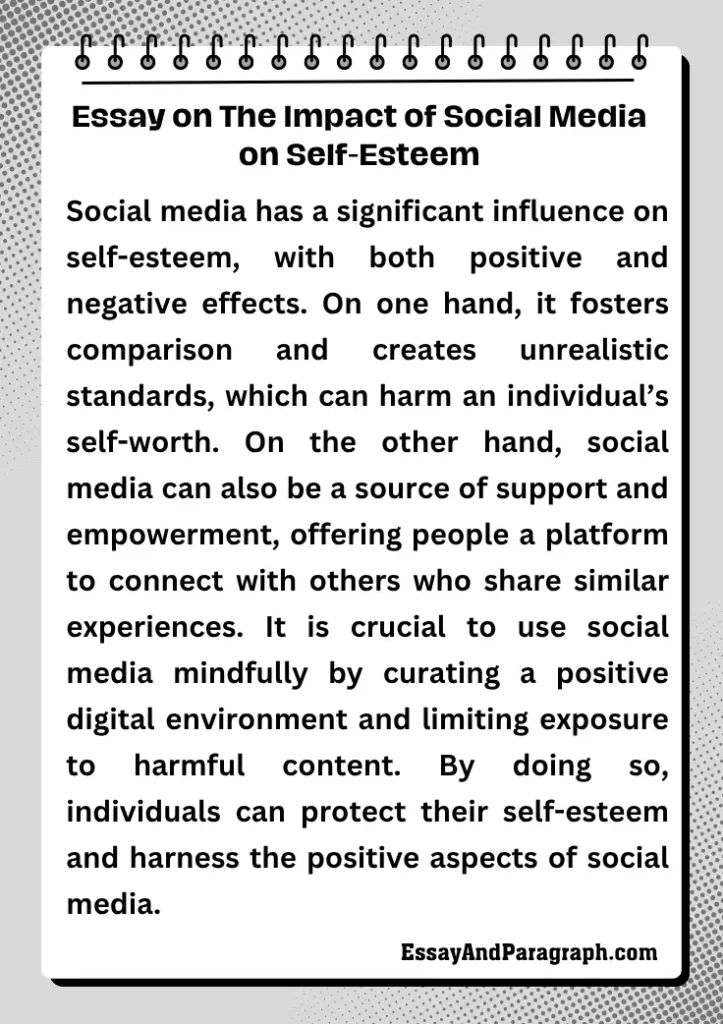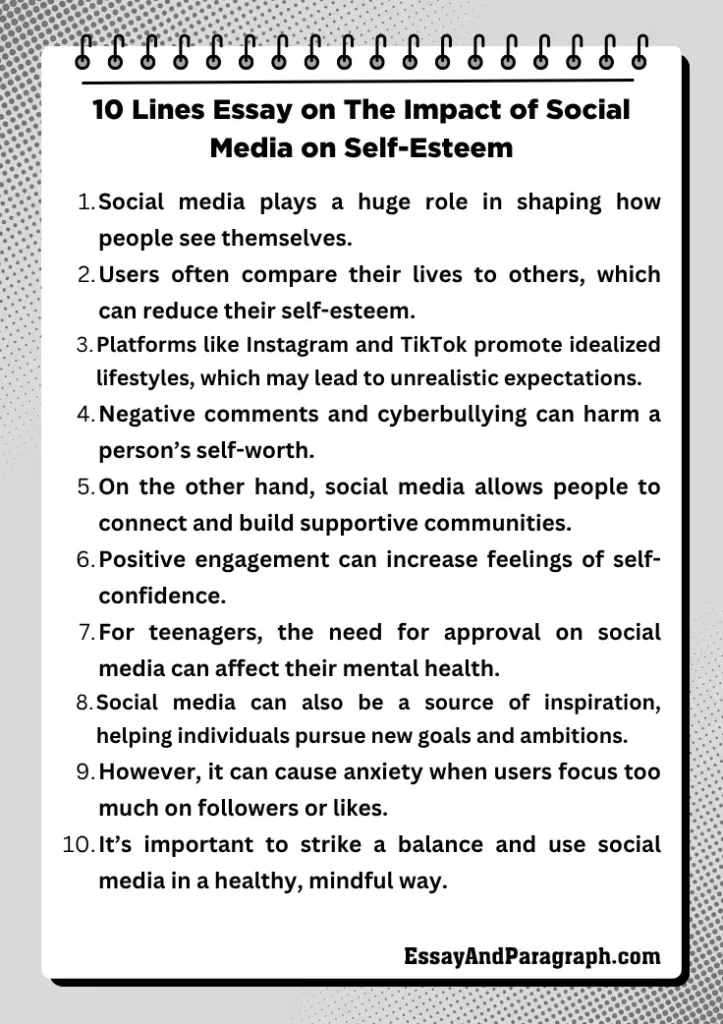Ever wondered how social media affects the way we feel about ourselves? With millions of users interacting daily, it’s clear that these platforms influence not only our thoughts but also our self-esteem. Social media can serve as a space for self-expression, but it can also expose us to unrealistic standards. Many users, especially young people, struggle with comparing their lives to the curated content they see online, often leading to self-doubt or body image issues. In this article, we will explore how social media impacts self-esteem, both positively and negatively.
10 Lines Essay on The Impact of Social Media on Self Esteem
Social media plays a huge role in shaping how people see themselves.
Users often compare their lives to others, which can reduce their self-esteem.
Platforms like Instagram and TikTok promote idealized lifestyles, which may lead to unrealistic expectations.
Negative comments and cyberbullying can harm a person’s self-worth.
On the other hand, social media allows people to connect and build supportive communities.
Positive engagement can increase feelings of self-confidence.
For teenagers, the need for approval on social media can affect their mental health.
Social media can also be a source of inspiration, helping individuals pursue new goals and ambitions.
However, it can cause anxiety when users focus too much on followers or likes.
It’s important to strike a balance and use social media in a healthy, mindful way.

10 Lines Essay on The Impact Of Social Media On Self Esteem
Essay on The Impact of Social Media on Self Esteem – 100 Words
Social media can affect self-esteem in both positive and negative ways. While it allows people to connect and share their lives, it often leads to comparisons with others, causing feelings of inadequacy. Platforms like Instagram and TikTok showcase filtered versions of reality, which can make users feel less confident about their own lives or appearances. On the positive side, social media provides a space for self-expression and support from like-minded individuals. However, when users focus too much on validation through likes and followers, it can negatively impact their mental health and self-worth.
Essay on The Impact of Social Media on Self Esteem – 200 Words
Social media has become an integral part of our lives, with millions of people sharing their thoughts, photos, and experiences every day. However, this constant exposure to others’ lives can greatly impact how individuals perceive themselves. The act of comparing oneself to the seemingly perfect lives portrayed online can cause anxiety, self-doubt, and low self-esteem. Studies show that people, especially teenagers, who spend more time on social media, tend to experience higher levels of dissatisfaction with their appearance and body image.
While social media has its drawbacks, it can also be a source of positivity. Many users find encouragement and support in online communities that help boost self-confidence and self-esteem. Sharing personal achievements or stories can foster a sense of belonging and validation, which can be incredibly empowering. For example, some platforms offer body-positive content and mental health awareness pages, which help counteract negative stereotypes.
The key to maintaining healthy self-esteem in the digital age is balance. It’s essential to limit social media use, avoid comparisons, and focus on real-life connections. Social media should be a tool for inspiration, not a measure of self-worth.
Essay on The Impact of Social Media on Self Esteem – 250 Words
Social media’s influence on self-esteem is undeniable. Platforms like Facebook, Instagram, and Twitter give users the ability to showcase their lives, but this often comes at the cost of comparisons with others. It’s easy to fall into the trap of thinking that everyone else’s life is more exciting or more perfect. For many, this leads to feelings of inadequacy or low self-worth.
The pressure to present a picture-perfect life online can be overwhelming. People often post filtered images, highlighting only the best parts of their day, leading others to believe that everyone else has a more successful or fulfilling life. This idealized version of reality can cause anxiety, especially among young people who may struggle with body image issues or the desire to fit in.
However, social media isn’t all negative. It also provides opportunities for connection and growth. Users can follow pages or groups that encourage positive self-image, mental health awareness, and self-empowerment. Many find support in online communities where they can share their struggles and triumphs without judgment.
Despite the potential for harm, social media has the power to boost self-esteem when used mindfully. By unfollowing accounts that promote negativity or comparison, users can create a more positive digital environment for themselves. It’s important to remember that self-worth isn’t defined by likes, followers, or online validation.
Essay on The Impact of Social Media on Self Esteem – 500 Words
Social media has become an inseparable part of modern life. From connecting with friends to sharing achievements, it offers countless opportunities for self-expression. However, its impact on self-esteem has been a topic of concern. The constant exposure to curated content often leads to comparison, with many users feeling that their lives don’t measure up. Whether it’s the perfect body, lavish vacations, or an enviable career, social media paints an idealized version of reality that can have a negative effect on how people see themselves.
The phenomenon of social comparison is one of the main ways social media affects self-esteem. Research has shown that individuals who spend more time on platforms like Instagram and Facebook tend to have a higher likelihood of feeling dissatisfied with their own lives and appearances. This is especially true for younger audiences who are more vulnerable to the pressures of social validation. As they scroll through endless posts of perfectly edited photos, they may internalize the belief that their own lives fall short.
This can lead to feelings of anxiety, depression, and poor body image. The constant need for validation, through likes and comments, can become an obsession for some, eroding their self-worth. Cyberbullying is another issue that exacerbates the problem. Negative comments or harassment on social media can deeply impact one’s confidence and contribute to a decline in mental health.
While these negative effects are real, social media doesn’t have to be inherently harmful. Many users find empowerment and confidence by sharing their personal stories, passions, and achievements. Communities that promote body positivity, mental health awareness, and self-empowerment have gained traction on platforms like Instagram, offering a space for individuals to express themselves freely without fear of judgment.
Furthermore, social media has allowed people to connect with others who share similar experiences, creating a sense of belonging. Many find comfort in these online spaces, where they can talk about challenges like mental health struggles, body image issues, or personal growth. These connections can help build self-esteem and remind individuals that they are not alone.
In terms of future expectations, it is essential that individuals use social media with mindfulness. Experts recommend setting boundaries on social media use, unfollowing accounts that promote negative comparisons, and curating a digital environment that fosters positivity and self-love. It’s also important to acknowledge that self-worth is not determined by external validation, but by an inner sense of value.
Ultimately, social media is a tool that can either enhance or harm self-esteem depending on how it is used. It’s up to individuals to take control of their online experiences and create an environment that supports their mental well-being.
FAQs
1. How does social media affect self-esteem?
Social media can negatively impact self-esteem by fostering unhealthy comparisons. Users often compare themselves to the idealized versions of others’ lives they see online, leading to feelings of inadequacy. The desire for validation through likes, followers, or comments can also affect one’s self-worth.
2. Can social media ever improve self-esteem?
Yes, social media can improve self-esteem when used positively. Many users find support and encouragement in online communities that focus on self-empowerment, mental health awareness, and body positivity. Sharing personal achievements and stories can help boost confidence.
3. Why do people compare themselves on social media?
People compare themselves on social media because they are often exposed to filtered or curated versions of others’ lives. This creates unrealistic expectations and makes individuals feel like they are missing out or not measuring up to others’ perceived successes.
4. What is cyberbullying, and how does it relate to self-esteem?
Cyberbullying is the act of harassing or bullying others online. It can have a significant negative impact on self-esteem, causing feelings of shame, isolation, and sadness. Victims of cyberbullying may struggle with mental health issues and lower self-worth.
5. How can I protect my self-esteem while using social media?
To protect your self-esteem, limit your time on social media, unfollow accounts that make you feel bad about yourself, and focus on following positive and empowering content. It’s also important to remember that social media doesn’t define your worth, and offline relationships and accomplishments matter more.
Top 5 Quotes on The Impact of Social Media on Self-Esteem
“Comparison is the thief of joy.” – Theodore Roosevelt
“The more you connect with people online, the more you disconnect from yourself.” – Anonymous
“You are not defined by how many likes you get.” – Anonymous
“Social media is not real life.” – Anonymous
“The only approval you need is your own.” – Anonymous

Summary :
Social media has a significant influence on self-esteem, with both positive and negative effects. On one hand, it fosters comparison and creates unrealistic standards, which can harm an individual’s self-worth. On the other hand, social media can also be a source of support and empowerment, offering people a platform to connect with others who share similar experiences. It is crucial to use social media mindfully by curating a positive digital environment and limiting exposure to harmful content. By doing so, individuals can protect their self-esteem and harness the positive aspects of social media.











